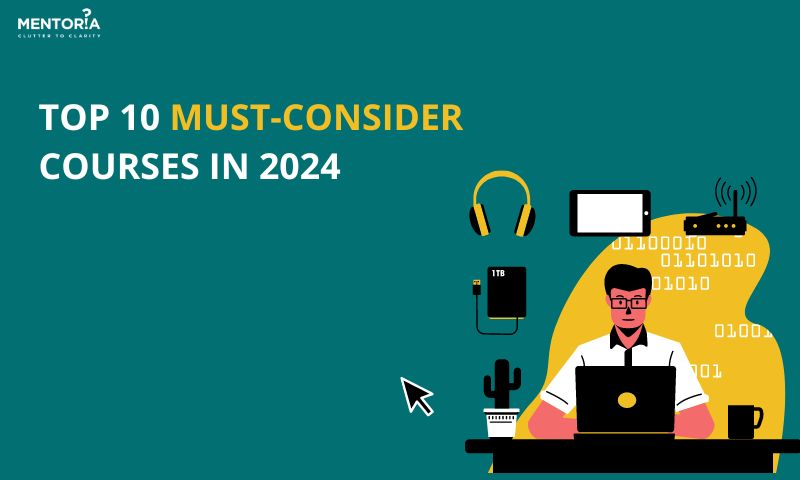Top 10 Must-Consider Courses In 2024

It’s no walk in the park for candidates to find job-oriented courses, especially when it comes to their career. In this cutthroat job market, only those with the right skills can chase after their dream job. But many of us are unsure about which career path to choose. This article is here to help you navigate through the most suitable career-oriented courses for 2024. The demand for these skill-focused courses will only increase in the coming years, with no signs of decline. Stick with us till the end to discover the top ten courses, including their eligibility criteria, course fees, and more.
Data Science And Machine Learning
Data Science and Machine Learning are areas of study that centre around extracting valuable insights from data. In the realm of Data Science, we delve into data exploration and analysis to uncover patterns, trends, and useful information. This involves utilising a variety of tools and techniques to make sense of large datasets. On the other hand, Machine Learning falls under the umbrella of Data Science, where computers acquire knowledge from data and independently make forecasts or choices without the need for explicit programming. It’s akin to teaching a computer to recognise patterns and make intelligent choices based on examples. Ultimately, these fields enable us to make well-informed decisions, accurate predictions, and groundbreaking discoveries by harnessing the power of data and algorithms. Paid course worth INR 3,25,000 is available on upgrad.
Career Opportunities
Data Scientist
- Examining extensive datasets to uncover valuable insights and patterns.
- Creating predictive models to aid in decision-making.
Data Analyst
- Examining data to identify patterns, trends, and correlations.
- Providing actionable insights to support business strategies.
Machine Learning Engineer
- Constructing and implementing machine learning models for diverse applications.
- Enhancing algorithms to achieve optimal performance and precision.
Business Intelligence Analyst
- Utilising data to help organisations make informed business decisions.
- Designing and implementing data visualisation tools.
Skills Gained In Clinical Research
- Programming Proficiency: Mastering languages like Python and R for data analysis and machine learning.
- Statistical Analysis and Mathematics: Understanding statistical concepts and mathematical foundations for data modelling.
- Data Visualisation: Creating compelling visual representations of data using tools like Tableau or Matplotlib.
- Machine Learning Techniques: Learning and applying various machine learning algorithms for classification, regression, and clustering.
Artificial Intelligence And Robotics
AI is all about making machines that can do things that usually only humans can do. This includes solving problems, understanding language, recognising patterns, and making choices. AI can be used in lots of different areas, like virtual assistants and recommendation systems, as well as in medicine and self-driving cars. On the other hand, robotics is all about designing, building, and using robots. Robots are physical machines that can be programmed to do things on their own or with some help from humans. They often use AI to make them even smarter and better at adapting to different situations. So, AI is about creating smart systems that can think and make decisions, while robotics is about building physical machines that can do things in the real world. When you put AI and robotics together, you get intelligent, independent systems. Paid courses are available offline in IIT Chennai, IIT Bombay, IIT Delhi, BITS Pilani.
Fees: B.Tech – Rs. 8 Lakh to Rs. 26 Lakh, M.Tech – Rs. 4 Lakh to Rs. 12 Lakh
Career Opportunities
AI Engineer
- Developing and implementing AI solutions to solve complex problems.
- Enhancing algorithms for machine learning applications.
Robotics Engineer
- Designing and building robotic systems for automation and various industries.
- Programming and optimising robotic functionalities.
Computer Vision Engineer
- Working on algorithms that enable machines to interpret and understand visual information.
- Developing applications like facial recognition and image processing.
Natural Language Processing (NLP) Specialist
- Creating systems that understand, interpret, and generate human-like language.
- Developing chatbots and language-based AI applications.
Skills Gained In Artificial Intelligence And Robotics Course
- Programming and Coding Skills: Proficiency in languages like Python and C++ for AI and robotics development.
- Machine Learning and Deep Learning: Understanding and applying machine learning algorithms and neural networks.
- Robotics Systems Design: Knowledge of hardware and software integration in designing robotic systems.
- Ethics and Responsible AI: Exploring ethical considerations and responsible practices in AI and robotics development.
Digital Marketing
A course on Digital Marketing and SEO teaches you the ins and outs of promoting businesses online and increasing their visibility on search engines. Throughout the course, you’ll explore different strategies to connect with potential customers using social media, email, and websites. It covers everything from creating captivating content and running ads to establishing a strong online presence that boosts brand awareness and drives sales. In the field of digital marketing, SEO, commonly referred to as Search Engine Optimisation, is essential. Increasing a website’s online visibility in search engine rankings is its main objective. By diving deep into the complexities of search engine algorithms, you gain valuable knowledge on how to utilise appropriate keywords and strategically organise content to elevate a website’s position. This makes it more likely for people searching for related information to find the website. In a nutshell, this course equips you with the necessary skills to effectively market businesses online and increase their visibility to potential customers through digital channels and optimised content.
Free Digital Marketing course is available on Coursera.
Career Opportunities
Digital Marketing Specialist
- Crafting and executing digital marketing strategies across various channels.
- Analysing campaign performance and optimising for better results.
SEO Analyst
- Conducting keyword research and implementing on-page and off-page SEO techniques.
- Monitoring and improving website rankings on search engines.
Content Marketing Manager
- Developing and overseeing content strategies to engage and attract audiences.
- Collaborating with SEO specialists to enhance content visibility.
Social Media Manager
- Managing and running social media campaigns on various platforms.
- Evaluating social media data and adapting tactics accordingly.
Skills Gained In Digital Marketing And SEO Course
Search Engine Optimisation (SEO)
- Mastering techniques for optimising websites and content for search engines.
- Understanding SEO tools and analytics.
Content Creation And Marketing
- Crafting top-notch, captivating content for diverse digital platforms.
- Executing content marketing tactics to boost audience interaction.
Social Media Management
- Developing social media plans and managing accounts effectively.
- Utilising analytics tools for measuring social media performance.
Digital Advertising
- Planning and executing digital advertising campaigns.
- Understanding the use of paid media channels for targeted marketing.
Cybersecurity
A cybersecurity class usually focuses on subjects that revolve around safeguarding computer systems, networks, and data from unauthorised entry, attacks, and harm. Students gain knowledge about cryptography, network security, ethical hacking, risk management, and security policies to enhance their abilities in protecting digital assets. Free course Available for this in Cisco networking academy.
Career Opportunities
Cybersecurity Analyst
- Monitoring and analysing security threats and incidents.
- Implementing measures to protect an organisation’s systems and data.
Ethical Hacker (Penetration Tester)
- Identifying vulnerabilities in systems through simulated attacks.
- Providing recommendations to enhance security.
Security Consultant
- Advising organisations on best practices for cybersecurity.
- Developing and implementing security policies and procedures.
Incident Responder
- Responding to and mitigating security incidents.
- Conducting forensic analysis to understand and prevent future breaches.
Skills Gained In Cybersecurity Course
Network Security
- Understanding and implementing measures to secure computer networks.
- Configuring firewalls, intrusion detection systems, etc.
Cryptography
- Knowledge of encryption techniques to protect data confidentiality.
- Implementing cryptographic protocols and algorithms.
Security Frameworks And Compliance
- Familiarity with cybersecurity frameworks and industry compliance standards.
- Ensuring adherence to regulations for data protection.
Security Awareness And Training
- Educating users and employees on cybersecurity best practices.
- Developing strategies to enhance overall security awareness.
Healthcare Technology
In a Healthcare Technology course, students explore how technology is integrated into the healthcare industry to improve patient care, streamline operations, and advance healthcare as a whole. The curriculum covers various topics such as electronic health records (EHRs), telemedicine applications, medical informatics, and healthcare data management systems. Students acquire a comprehensive grasp of how technology can securely store, retrieve, and share health information. They also learn about implementing and managing electronic health record systems, which centralise patient data, enhance communication among healthcare professionals, and support informed decision-making.
Telemedicine is another important aspect of the course, focusing on using technology to provide remote healthcare services. This includes virtual consultations, remote monitoring, and using telecommunication tools to bridge geographical gaps and increase access to medical expertise. Medical informatics is a key element, emphasising the effective use of information technology to organise and analyse healthcare data. Students learn about health information systems, data standards, and interoperability, contributing to the development of a seamless and interconnected healthcare ecosystem. The course also emphasises healthcare data management, teaching methods to collect, store, and protect health-related information while ensuring compliance with privacy regulations. This includes implementing data security measures, considering ethical considerations, and employing strategies to prevent unauthorised access. In general, a Healthcare Technology course provides students with the necessary knowledge and skills to navigate the constantly evolving field where technology and healthcare come together. It prepares them to contribute to the ongoing improvement of healthcare delivery and outcomes through innovative technological solutions. Free course is available for this on Coursera.
Career Opportunities
Health IT Specialist
- Implementing and managing healthcare information systems.
- Ensuring compliance with healthcare regulations and data security.
Clinical Informatics Analyst
- Analysing and optimising the use of technology in clinical settings.
- Facilitating communication between healthcare professionals and IT teams.
Medical Software Developer
- Designing and developing software applications for medical purposes.
- Ensuring user-friendly interfaces and compliance with healthcare standards.
Telehealth Specialist
- Implementing and supporting telehealth technologies.
- Enhancing remote patient monitoring and virtual healthcare services.
Skills Gained In Healthcare Technology Course
Health Information Systems
- Understanding electronic health records (EHR) and healthcare databases.
- Implementing and managing health information exchange systems.
Medical Device Integration
- Integrating and maintaining medical devices with healthcare IT systems.
- Ensuring interoperability and data accuracy.
Data Security And Privacy In Healthcare
- Implementing measures to protect patient data and comply with privacy regulations.
- Addressing cybersecurity challenges specific to healthcare.
Telemedicine Technologies
- Familiarity with technologies supporting remote healthcare services.
- Understanding the regulatory landscape for telehealth implementation.
Environmental Sustainability
Environmental sustainability is all about finding ways to meet our current needs without compromising the ability of future generations to meet their own needs. It involves using natural resources responsibly, reducing our impact on the environment, and maintaining a balanced ecological system. This means conserving resources, adopting renewable energy sources, reducing waste, and implementing sustainable development practices to ensure the long-term well-being of our environment. Free course is available for this course in class central.
Career Opportunities
Environmental Consultant
- Advising organisations on sustainable practices and compliance with environmental regulations.
- Conducting environmental impact assessments.
Renewable Energy Specialist
- Developing and implementing renewable energy projects.
- Analysing and optimising energy efficiency.
Sustainability Analyst
- Assessing and reporting on an organisation’s environmental performance.
- Recommending strategies for sustainable business practices.
Climate Change Analyst
- Helping to create strategies for dealing with the effects of climate change by studying and examining relevant data.
- Investigating and evaluating information on the consequences of climate change to support the formulation of plans for both reducing its impact and adapting to it.
Skills Gained In Environmental Sustainability Course
Environmental Science And Policy
- Understanding the scientific principles behind environmental issues.
- Familiarity with environmental policies and regulations.
Sustainable Resource Management
- Developing strategies for responsible use of natural resources.
- Implementing sustainable resource management practices.
Environmental Impact Assessment
- Conducting assessments to identify and mitigate environmental impacts.
- Interpreting and communicating assessment findings.
Corporate Social Responsibility (CSR)
- Integrating sustainability into corporate strategies.
- Understanding the role of CSR in fostering environmental responsibility.
Blockchain And Cryptocurrency
A typical Blockchain and Cryptocurrency course usually teaches the basic principles of blockchain technology and how cryptocurrencies function. The course covers topics such as the structure of blockchain, consensus mechanisms, smart contracts, and decentralised applications (DApps). Moreover, students will also learn about the history, economics, and practical aspects of different cryptocurrencies. The course may also touch upon security concerns, regulatory factors, and the overall influence of blockchain on various industries. To reinforce comprehension and practical application, the course often includes hands-on exercises and real-life case studies. Free course is available for this on class central.
Career Opportunities
Blockchain Developer
- Creating decentralised applications and implementing blockchain solutions.
- Proficient in programming languages like Solidity for smart contracts.
Cryptocurrency Analyst
- Analysing market trends, evaluating ICOs, and providing investment insights.
- Understanding the economic factors influencing cryptocurrency valuations.
Blockchain Consultant
- Offering expertise to businesses on adopting and integrating blockchain technology.
- Assessing and recommending suitable blockchain solutions.
Cryptocurrency Compliance Analyst
- Ensuring regulatory compliance in cryptocurrency transactions.
- Collaborating with legal teams to navigate evolving regulatory landscapes.
Skills Gained In Blockchain And Cryptocurrency Course
Smart Contracts And Solidity
- Developing and auditing smart contracts using languages like Solidity.
- Ensuring secure and efficient execution of code on blockchain platforms.
Market Analysis And Trading Strategies
- Conducting thorough market analysis for cryptocurrencies.
- Formulating and implementing effective trading strategies.
Blockchain Security
- Understanding cryptographic principles and securing blockchain networks.
- Identifying and addressing vulnerabilities to prevent attacks.
Cryptocurrency Wallet Development
- Building secure and user-friendly cryptocurrency wallets.
- Ensuring the integrity and privacy of digital asset storage.
UX/UI Design
UX (User Experience) and UI (User Interface) Design focus on creating positive interactions between users and digital products. UX Design involves understanding user behaviours, needs, and motivations to enhance overall satisfaction. It encompasses user research, wireframing, prototyping, and usability testing to create a seamless and enjoyable experience. UI Design, on the other hand, is about crafting the visual elements users interact with. It involves designing interfaces that are visually appealing, intuitive, and align with the brand. UI designers work on elements like buttons, icons, color schemes, and typography. In essence, UX ensures a product is user-friendly and meets users’ goals, while UI focuses on the aesthetic and functional elements that make up the interface. Both are crucial for creating successful and engaging digital experiences. Paid course is available for this in IIIT-B worth INR 1,06,200.
Career Opportunities
UX Designer
- Focusing on the overall user experience, ensuring products are intuitive and user-friendly.
- Conducting user research and creating wireframes to optimise usability.
UI Designer
- Creating visually attractive interfaces, which encompass icons, buttons, and layout.
- Working together with UX designers to craft a smooth and effortless user experience.
Interaction Designer
- Defining how users interact with digital products through animations and transitions.
- Ensuring a cohesive and engaging user journey.
Usability Tester
- Evaluating prototypes and finished products to identify usability issues.
- Providing feedback to improve the overall design and user experience.
Skills Gained In UX/UI Design Course
User-Centred Design
- Understanding user behaviours and preferences to inform design decisions.
- Prioritising user needs throughout the design process.
Prototyping And Wireframing
- Creating interactive prototypes and wireframes to visualise design concepts.
- Testing and refining prototypes based on user feedback.
Visual Design Tools
- Proficiency in tools like Sketch, Figma, or Adobe XD for visual design.
- Translating design concepts into pixel-perfect interfaces.
User Research And Testing
- Conducting user interviews, surveys, and usability tests to gather insights.
- Iterating designs based on feedback to enhance user satisfaction.
Ethical Hacking
Ethical hacking, also referred to as white-hat hacking, involves utilising similar methods as those crafty hackers to uncover vulnerabilities in computer systems, networks, and applications. However, ethical hackers have the permission of system owners to carry out these tests, making their actions both legal and ethical. The main objective of ethical hacking is to identify weaknesses before cybercriminals can exploit them. By discovering and fixing these vulnerabilities, ethical hackers assist organisations in strengthening their security and protecting against potential cyber attacks.
Ethical hackers employ various tools and techniques, such as network scanning, code analysis, and social engineering, to simulate real-world attacks and evaluate the security of systems. They then provide detailed reports to the organisation, outlining their findings and recommendations for enhancing security. Ethical hacking necessitates a deep understanding of computer systems, networks, and cybersecurity principles. It also requires integrity, professionalism, and a commitment to ethical behaviour. Ethical hackers must adhere to strict codes of conduct and follow legal guidelines to ensure that their activities are both lawful and ethical. In general, ethical hacking plays a vital role in safeguarding digital assets and upholding the integrity of online systems and services. It is a challenging and fulfilling field that offers opportunities to make a positive impact in the battle against cybercrime. Free ethical hacking course is available for this on Coursera.
Career Opportunities
Penetration Tester
- Penetration testers, or ethical hackers, are tasked with uncovering and exploiting vulnerabilities in computer systems, networks, and applications.
- They simulate cyber attacks to assess organisational security levels and provide recommendations for strengthening defences.
Security Consultant
- Security consultants offer their expertise and guidance to organisations, aiding in the enhancement of their security measures.
- They assess potential risks, develop effective security strategies, and assist in implementing protective measures to mitigate cyber threats.
Security Analyst
- Security analysts vigilantly monitor networks and systems to detect security breaches, unauthorised access, and suspicious activities.
- They meticulously analyse security logs and alerts, conduct thorough investigations into potential security incidents, and recommend appropriate actions to mitigate threats.
Skills Gained In Ethical Hacking Course
Technical Proficiency
- Ethical hacking offers individuals an opportunity to develop robust technical skills in computer networking, operating systems, and programming languages.
- Through understanding system and network operations, ethical hackers can adeptly identify vulnerabilities and evaluate security risks.
Security Knowledge
- Ethical hackers gain comprehensive knowledge about common security risks, attack methods, and strategies to exploit vulnerabilities.
- They explore various types of malicious software, tactics employed in social engineering, and the basics of cryptography. This expertise enables them to anticipate and preemptively tackle potential security threats.
Problem-Solving Abilities
- Ethical hacking involves navigating complex problem-solving challenges, such as identifying security vulnerabilities, devising attack strategies, and formulating effective countermeasures.
- Ethical hackers excel in critical and creative thinking, allowing them to surmount security obstacles and innovate solutions to protect digital assets.
Communication Skills
- Communication plays a vital role in ethical hacking as ethical hackers frequently need to explain technical discoveries and suggestions to individuals without a technical background.
- Ethical hackers learn to convey intricate security ideas in a simple and understandable manner, facilitating cooperation with coworkers and clients in effectively addressing security issues.
Renewable Energy Engineering
Renewable Energy Engineering is all about creating, improving, and putting into action systems that make use of sustainable energy sources. Some important aspects of this field include:
Solar Energy
- Creating solar photovoltaic (PV) systems to generate electricity.
- Developing solar thermal systems for heating or electricity production.
Wind Energy
- Designing wind turbines and evaluating wind farm layouts.
- Analysing wind resource data to maximise energy generation.
Hydroelectric Energy
- Designing and optimising hydroelectric power plants.
- Assessing the environmental impact and sustainability of such plants.
Bioenergy
- Developing systems that convert organic materials into energy.
- Designing processes for biofuel production.
Geothermal Energy
- Designing geothermal power plants to generate electricity.
- Assessing the exploration and utilisation of geothermal resources.
Engineers in this field focus on improving energy conversion efficiency, minimising environmental impact, and tackling challenges associated with intermittent energy sources. Their work is vital in transitioning towards a more sustainable and eco-friendly energy landscape.
Career opportunities
Solar Energy Engineer
- Designing and implementing solar power systems for electricity generation.
- Optimising solar panel efficiency and integration into various applications.
Wind Energy Engineer
- Designing wind turbines and wind farms for efficient energy production.
- Analysing wind patterns and optimising turbine placement.
Hydroelectric Engineer
- Planning, designing, and managing hydroelectric power plants.
- Assessing the environmental impact and sustainability of hydro projects.
Bioenergy Systems Engineer
- Developing systems for converting organic materials into bioenergy.
- Designing and optimising processes for biofuel production.
Skills Gained In Renewable Energy Engineering Course
Energy Systems Analysis
- Evaluating and optimising the performance of renewable energy systems.
- Conducting feasibility studies for various renewable projects.
Environmental Impact Assessment
- Evaluating the ecological consequences of renewable energy initiatives.
- Incorporating sustainability principles into engineering procedures.
Energy Policy And Regulation
- Understanding and navigating regulatory frameworks for renewable energy.
- Contributing to the development of sustainable energy policies.
Project Management In Renewable Energy
- Planning and executing renewable energy projects efficiently.
- Managing resources, timelines, and budgets for successful implementations.
The Future Of Education
Take control of your destiny because your future lies within your grasp. Education holds the power to unlock endless opportunities. The top 10 courses for 2024 have arrived to simplify your path. Whether you’re embarking on a new career or aiming for advancement, these courses equip you with the necessary skills to flourish. Make a wise choice, invest in your own growth, and prepare yourself for a brilliant and rewarding future.
Discover your strengths and areas for growth with Mentoria’s career guidance. Whether you’re looking to excel in your current role, explore a new one in your industry, or switch to a completely different field, our counsellors will create a personalised action plan for you. With 3 streams, 850+ courses, and 12,000+ careers, we help you find your perfect fit. Call us to speak with career mentors and kick-start your journey toward a happy and successful future.
















